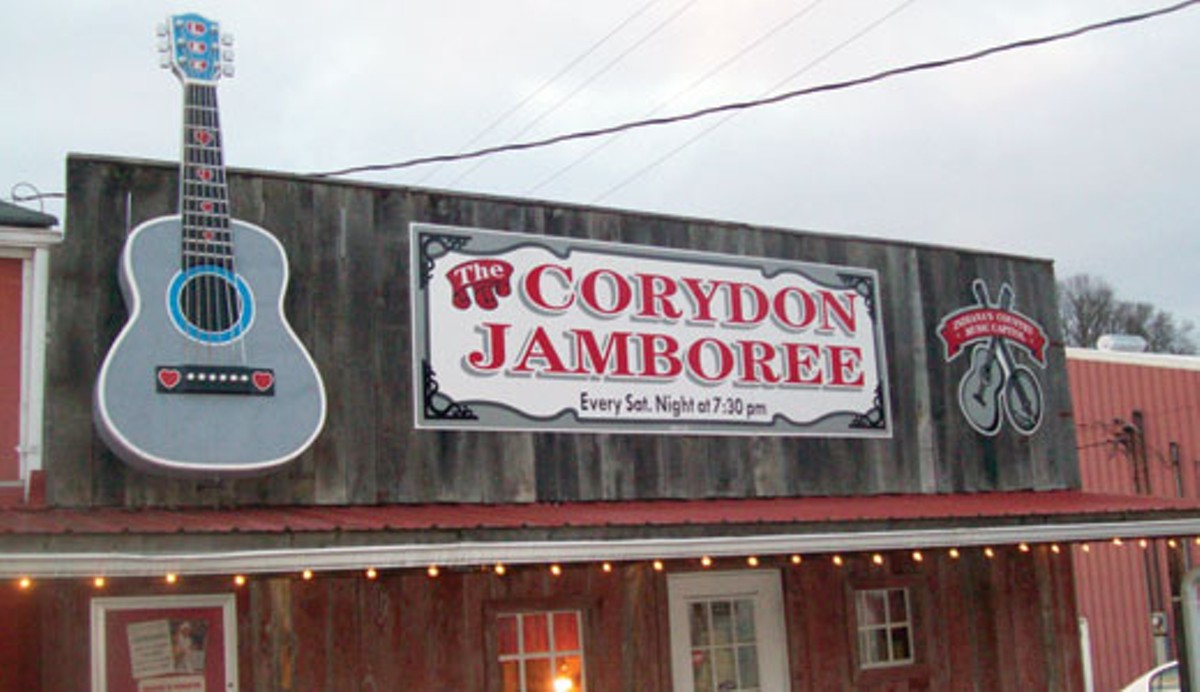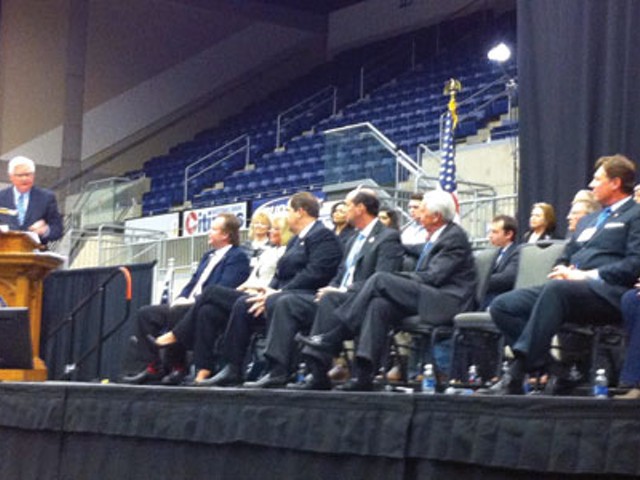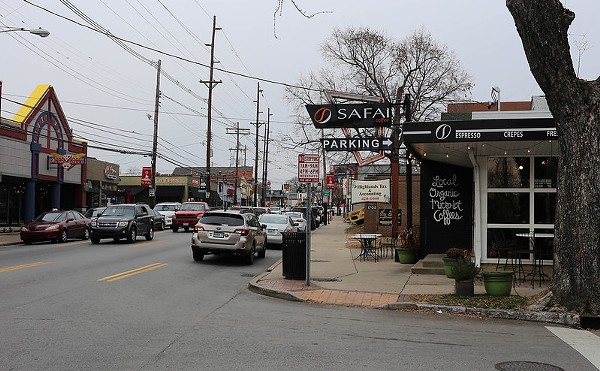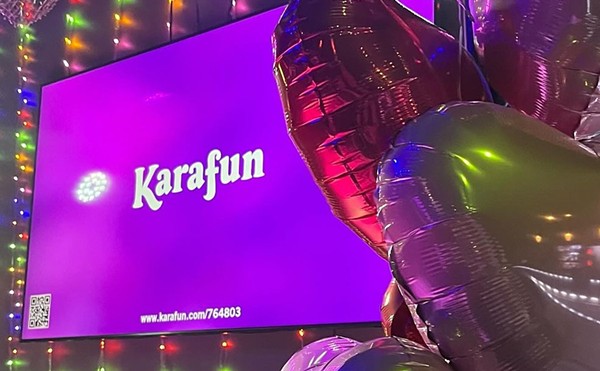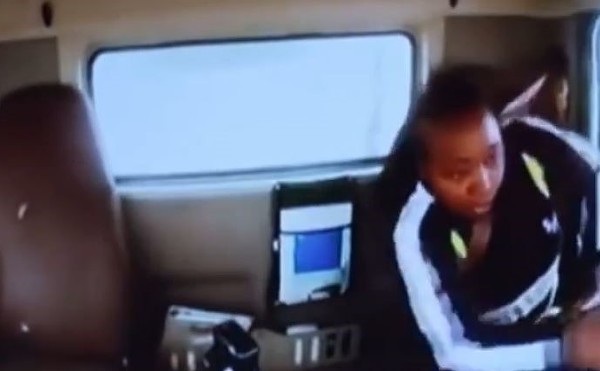“Karaoke pretty much killed live music like this,” the soundman, Eric, says during the first intermission. I nod and mumble something in agreement, a little amazed by it all. Before tonight, I didn’t know anything like the Corydon Jamboree ever existed.
It’s as if Carrie Underwood hadn’t won “American Idol.” It’s as if Shania Twain was simply a Botoxed bad dream. Hell, tonight’s music stretches so far back, it’s as if Willie Nelson never even cut a record. Visiting the Corydon Jamboree is akin to visiting Nashville if it had simply stopped evolving after, say, 1962. The music streams directly from that golden age of country songwriting fixated on spoiled love, late nights and hope. But that’s only part of what has me so pleasantly stunned. The Jamboree, as a whole, feels like the last of a dying breed. I try to take in as much as possible during a visit to this small Indiana town. At the center of this country music time capsule is Lee Parr King, the finely dressed star of the show who does not operate like any emcee you are likely to come across.
LET’S PUT ON A SHOW
“Did I tell y’all I got a new dog?”Dave Newman holds a wireless mic just below his faded mustache. He prowls the aisles wearing a black Stetson and a very lived-in cowboy shirt. “Yep, I got me a carpenter dog.”
Newman waits another beat. “They call him a carpenter dog because he does odd jobs around the house.”
The joke nets big laughs from the crowd. In that audience, I am one of the few people who didn’t enter with either white hair, a walker or both, but I feel right at home. The family reunion friendliness is viral tonight — so viral I surprise myself by laughing, too.
Newman’s squeaky-clean humor is the first indication that the Corydon Jamboree is something else. This is a legitimate show, not just another concert. The Jamboree is a production with, by my best guess, at least a 10-person crew. That they have a comedian warming up the crowd speaks volumes about what is going on in this Indiana hamlet, a budget Opry of sorts.
Newman discovers visitors have traveled from as far away as Illinois, Toledo and South Carolina to hear old-fashioned country music tonight. A few hundred of us lean back in battered auditorium seats spread out across a large hall with a tall ceiling. The room is filled with concession stand smells of popcorn and Maxwell House. It is reminiscent of a VFW — but with guitars and mandolins and farm implements lining the wall. Threshers and yokes and pitchforks and a rifle hang above the emergency exits. Cattle skulls are nailed into the white drywall. Over the stage is a pair of double-handled saw blades, hand-painted to read: THE BROKEN HEARTS and CORYDON JAMBOREE.
Red curtains are pulled shut across the stage as Newman tells a couple more folksy one-liners. The routine goes over well. The crowd laughs the same way Newman tells jokes: sans irony. In fact, the entire three-act production is presented with this same earnestness. It catches me off guard at first. Earlier, when rolling down the Jamboree’s gravel driveway, I had different expectations. I’d heard rumors of real country music out in the Indiana hinterlands. This created honky-tonk visions of beer mugs tossed against chicken wire and of fistfights between men in snakeskin boots.
Instead, I got something far better — something more authentic than my imagination. I find Lee Parr King running a country music empire completely out of step with trends. I find a concert hall as friendly and familiar as a church basement. I find an audience who cherishes the way a good George Jones duet made them feel 40 years ago, and isn’t ready to let that emotion escape. I find I want a little of this for myself.
As Dave Newman wraps up his set, I am unexpectedly wiped clean of the snark and pretension honed by years of rock-club patronage. “You know what, I shot my first turkey last week … the meat department manager over at Kroger’s got pretty upset,” Newman says. “But he got over it.”
We laugh again.
FIRST STAR I SEE TONIGHT
“That one’s my cell right there, buddy,” Lee Parr King says, pointing at one of the four phone numbers crammed onto the Jamboree’s apple-red business card. “Call me anytime.”I have only spoken to King once or twice, and he always calls me “buddy.” I sense everyone is his buddy, and I love it. He has a grandfatherly charisma that makes me want to be his pal, to play poker together and maybe figure out what makes him tick. Lee Parr King is the star of the Corydon Jamboree, and he might just be the most unassuming star on any stage in America. But then again, there is a surprising bit of flash about him, too. Like the Jamboree itself, there is something old and new about King.
When I walk into the lobby, decorated in aged barn slats and memorabilia, King is impossible to miss among the elderly crowd holding yellow tickets. I play dumb and ask King’s wife, Faye, who takes tickets from behind a wide glass counter, for help. She points to a man in a tall black Stetson, black shirt and pants and a white vest. He wears thick glasses below his perfect white eyebrows. He is large-bellied and tall, with an expression of seriousness that occasionally breaks into a chuckle, only to fall back into that straight focus.
King is the Jamboree’s owner, producer and emcee. He has put on a show every Saturday night since 1992. He speaks in a soft, abrupt voice carrying a light twang. He tells me a little about the show, about how tonight’s featured performer, Lynn Owsley, was actually their first guest when the Jamboree opened its doors. Old and new circling back around again.
King gives me a brief history, though I frequently lose concentration. He wears several rings, which seems pretty loud for such a quiet guy. I find myself staring at his bracelet and turquoise wristwatch, at his shiny silver shirt-collar clips. From the little I know, King doesn’t strike me as an accessories guy. I assume these are a sign of his stage presence, of a flash waiting to be ignited. I bet he comes alive under the spotlight.
KING OF THE BROKEN HEARTS
The curtain parts after Dave Newman waves goodbye, and Lee and his band, The Broken Hearts, officially begin. Up on a wide stage, the Jamboree’s horse barn motif hits full stride. The same raw, wooden slats from the entryway line the back wall. Hay bales are scattered at the musicians’ feet. Horse tack, oil lanterns and, oddly, a good number of stuffed barn animals decorate the walls and amplifiers.King stands in the center of the eight-member ensemble of guitars, bass, keyboards, drums, steel guitar and fiddle. Most of the band, save for the female keyboardist and backup singer, wear jeans and white shirts and cowboy hats. Under that spotlight, King’s bone-white acoustic guitar is decorated with small, sparkling hearts around the center hole. “LEE” is painted on the headstock and also embedded into his leather guitar strap. He has all the markings of a gregarious emcee.
Except King barely moves on stage. His foot does not tap, his head does not bob, his hips most certainly do not shake. When he changes chords, his fingers seem to barely even move. King is clearly not nervous; he’s just maintaining that unflinching focus I saw in the lobby. Lee Parr King is hard at work.
While there is a lot of glitz to King’s outfit, he avoids hamming it up for the crowd. The man doesn’t even sing. He seems to hold the role of emcee only to ensure the show goes smoothly. You get the sense he doesn’t need the attention, which makes his role very much an anomaly. Lee Parr King is a man in the spotlight, but not of the spotlight. He isn’t shy about being there, but doesn’t really demand our attention. He is, instead, the stable hub around which this country music carousel revolves, operating more as an onstage manager. King ushers new guests up and cues band members to sing their song. He introduces each performer simply, without fanfare or emotion. It seems he doesn’t want to get in the audience’s way, between them and the entertainment they come for week after week. It’s part of King’s genius to know this. People come to the Corydon Jamboree for that rare music.
BUT NOT FORGOTTEN
“This one is a favorite of mine,” says the Broken Hearts’ backup singer, Libby Lowry, with a grin. It’s early in the three-hour show and her turn for a solo. “It’s an old Cal Smith number called ‘The Lord Knows I’m Drinking.’” The song is as country as a saloon door, mixing religion and drinking and love in one tight package.I consider myself fairly knowledgeable about country music history. For example, when King told me tonight’s special guest, Lee Owsley, played steel guitar for Ernest Tubb, I could name several of Tubb’s tunes. I have, however, never heard of Cal Smith, or his views on the Lord and booze.
I am the only one in that camp. At the Jamboree, I am among Cal Smith people. This style of lonesome, shuffling, fiddle-heavy country music hits a sweet spot they cannot find anywhere else. It brings out something in the crowd. I spot a grey-haired couple in the front row wearing denim and flannel and stark white Velcro walking shoes. They stare straight ahead throughout the song while the man taps his wife’s thigh to the beat, which, in my experience, is the Indiana equivalent of making-out.
Deep cuts like this are exactly what the Jamboree crowd craves. Like a lot of the night’s music, songs like “The Lord Knows I’m Drinking” were a big hit many decades ago (No. 1 in 1973, in fact) but feel forgotten today. The Broken Hearts embrace that classic Nashville sound perfectly. The night is studded with numbers by George and Tammy, Merle Haggard, Patsy Cline and a string of more obscure artists I couldn’t recall on a bet. That game of discovery becomes part of the fun itself.
Nobody in the audience holds up an iPhone, which adds to the timeless element. Actually, one woman did take a pre-show pic with an iPad; it seemed so out of place, even I looked at her funny. Everyone has come just to listen. The Jamboree crowd seems to share Lee Parr King’s focus and obvious love of this music.
IT’S NOT UNUSUAL
The biggest show of love comes from the applause following a really fine version of “Old Time Religion.” Later, I cringe when the Heart Breakers’ young drummer declares he will be singing Alan Jackson’s 1993 hit “Chattahoochee.” Lined up alongside these sturdy classics, the Jackson song seems too recent, too rock ’n’ roll to work. However, it gets the second largest round of applause tonight. The crowd, like the Jamboree itself, surprises me with its comfort in that gap between the old and new.Midway through the second act, Dale Whitson walks slowly across the stage. He wears a maroon blazer and matching tie. Throughout the night, he is the only performer without accompaniment from the Broken Hearts. Whitson delivers a gospel song played like a cowboy ballad on his acoustic guitar. He sings in a soft voice that probably began harmonizing when Hoover was in the White House. Watching his thinning hair and stooped back, I realize Whitson is probably about the same age as Hank Williams, had the latter lived.
Hank Williams makes me think maybe what I’m witnessing at the Corydon Jamboree isn’t so unusual after all. Country music has always been a blend of nostalgic old ways and slick modernism. We tend to think the Nash Vegas swagger of country’s last few decades is something new. But don’t forget, Williams sang those classic songs of heartbreak while wearing a very modern, rhinestone-spangled nudie suit. Country music has always straddled old and new, but nobody these days pulls it off as perfectly as they do in Corydon.
Maybe it is Whitson’s singing — a lonesome number made lonelier by a denture-induced lisp — but I get sad. Not the sadness of sin he sings of, but that depression brought on by realizing the unfairness of time. I am suddenly stricken with that same helpless heartbreak of watching beloved grandparents wind down and stop. I don’t want things like the Corydon Jamboree to ever wind down. But I understand, someday they must. It is the last of its kind.
I am reminded of another thing the soundman, Eric, said: “Our clientele is literally dying off.”
FOREVER AND EVER, AMEN
“So,” Lee Parr King says, shaking my hand with a heavy grasp after the show has ended. “What’d ya think, buddy?”I find myself stumbling with words. I thought quite a lot of things about the Corydon Jamboree, all of them positive, but don’t know how to say it. King and I don’t really speak the same language. His generation tends to be less ambivalent, more focused. I get the sense he would have no capacity for my pop-culture comparisons and would return any good-natured sarcasm with his onstage stare. I push beyond some internal filter urging me not to and answer him honestly, like George Jones would in a song. I tell King it was great. I tell him I loved it. I tell him I’ve never seen anything like it.
He nods, seemingly not too surprised. “Well, we’re here every Saturday. Come on back anytime.”
I say goodbye and weave through a crowd chatting the way folks do after Sunday service. There’s a feeling of family and tradition and history that I like here. I am already looking forward to bringing friends who have also never seen anything like the Jamboree. Before I’ve walked back to my car, I begin wondering how to describe it to them. There is nothing kitsch about the Jamboree, like, say, the recent trend of young men playing banjos and old-timey folk music. And it is nothing anywhere near the cheese of Branson, either.
I want to tell them there are few places left where the new does not simply devour the old, or, worse, regurgitate the old into caricature. The magic of Lee Parr King’s Jamboree is what has made it sustainable for so many years: its ability to find music somewhere between the old and new.
I think of telling them about the smell of popcorn and Maxwell House, about the sweetness of a man keeping the beat on his wife’s leg, about how this is the country music I always hoped existed in secret, out-of-the-way places.
Instead, as I take a lap around sleepy Corydon late on a Saturday night, I decide I will tell them good things don’t last, so it’s important to embrace them while they do.
Lee Parr King is hard at work.
The Jamboree is closed on Dec. 28 due to the holidays. For directions and a schedule, go to corydonjamboree.synthasite.com.

